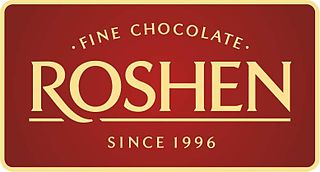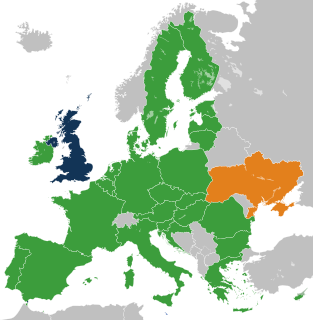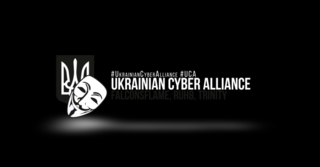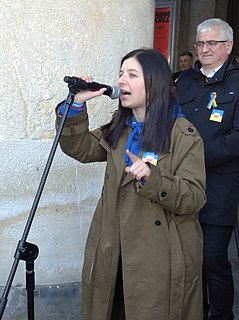
Non-tariff barriers to trade are trade barriers that restrict imports or exports of goods or services through mechanisms other than the simple imposition of tariffs.

The European single market, internal market or common market is a single market comprising the 27 member states of the European Union (EU) as well as – with certain exceptions – Iceland, Liechtenstein, and Norway through the Agreement on the European Economic Area, and Switzerland through sectoral treaties. The single market seeks to guarantee the free movement of goods, capital, services, and people, known collectively as the "four freedoms". This is achieved though common rules and standards in which all the EU member states are legally required to follow.

Relations between the European Union (EU) and the People's Republic of China (PRC) or Sino–European relations are bilateral relations that were established in 1975 between the PRC and the European Community. The EU is the PRC's largest trading partner, and the PRC is the EU's largest trade partner.

Roshen Confectionery Corporation is a Ukrainian confectionery manufacturing group. It operates facilities in the Ukrainian cities of Kyiv, Vinnytsia, Ivankiv and Kremenchuk, as well as in Budapest, Hungary and Klaipėda, Lithuania. The name of the company was derived from the last name of its owner Petro Poroshenko - Poroshenko, who also was the president of Ukraine between 2014-2019.
The 2006 Transnistrian customs crisis started on March 3, 2006, when Ukraine imposed new customs regulations on its border with Moldova on the Transnistrian region by declaring that it will only import goods from Transnistria with documents processed by Moldovan customs offices, as part of the implementation of a joint customs protocol between Ukraine and Moldova on December 30, 2005.

The Eurasian Customs Union was a customs union consisting of all the member states of the Eurasian Economic Union. The customs union was a principal task of the Eurasian Economic Community, established in 2000, and succeeded by the Eurasian Economic Union. No customs were levied on goods travelling within the customs union and – unlike a free-trade area – members of the customs union imposed a common external tariff on all goods entering the union. The Eurasian Union negotiated as a single entity in international trade deals, such as the World Trade Organisation, instead of individual member states negotiating for themselves.

Andriy Petrovych Klyuyev, also spelled as Andrii Kliuiev, is a Ukrainian businessman and politician, who was ranked as 7th "Most influential person in Ukraine" in 2011 by Korrespondent.

The European Union–Ukraine Association Agreement is a European Union Association Agreement between the European Union (EU), the European Atomic Energy Community (Euratom), Ukraine and the EU's 28 member states at the time. It establishes a political and economic association between the parties. The agreement entered into force on 1 September 2017; previously parts had been provisionally applied. The parties committed to co-operate and converge economic policy, legislation, as well as regulation across a broad range of areas, including equal rights for workers, steps towards visa-free movement of people, the exchange of information and staff in the area of justice, the modernisation of Ukraine's energy infrastructure and access to the European Investment Bank (EIB). The parties committed to regular summit meetings and meetings among ministers, other officials and experts. The agreement furthermore establishes a Deep and Comprehensive Free Trade Area between the parties.

The 17 December 2013 Russian–Ukrainian action plan was a de facto defunct proposed agreement between the Russian President Vladimir Putin and former Ukrainian President Viktor Yanukovych publicized on 17 December 2013 whereby Russia would buy $15 billion of Ukrainian Eurobonds to be issued by Ukraine and that the cost of Russian natural gas supplied to Ukraine would be lowered to $268 per 1,000 cubic metres. The treaty was signed amid the escalating Euromaidan movement which sought closer ties between Ukraine and the European Union. The interest rate on the loan would be renegotiated every three months, based on a verbal agreement between the two leaders.

"Do not buy Russian goods!" or "Boycott Russian goods!" is a nonviolent resistance campaign to boycott Russian commerce in Ukraine. The protest started on 14 August 2013 as a reaction to a Russian Federation trade embargo against Ukraine. It was organized by Vidsich on social media. The campaign expanded to mass distribution of leaflets, posters, and stickers in over 45 cities and towns. Having faded by the beginning of the Euromaidan demonstrations in November 2013, it was renewed on 2 March 2014, during the Crimean crisis and the Russo-Ukrainian War.
Dovzhansky is a land border crossing between Ukraine and Russia on the Ukrainian side, in the town of Dovzhansky, Sverdlovsk city municipality, Luhansk Oblast.

Shehyni is a land border crossing between Ukraine and Poland on the Ukrainian side, near the village of Shehyni, Yavoriv Raion, Lviv Oblast.
A customs declaration is a form that lists the details of goods that are being imported or exported when a citizen or visitor enters a customs territory. Most countries require travellers to complete a customs declaration form when bringing notified goods across international borders. Posting items via international mail also requires the sending party to complete a customs declaration form.

The Ukrainian Cyber Alliance is a community of Ukrainian cyber activists from various cities in Ukraine and around the world. The alliance emerged in the spring of 2016 from the merger of two cyber activists, FalconsFlame and Trinity, and was later joined by the group RUH8 and individual cyber activists from the CyberHunta group. The hacktivists united to counter Russian aggression in Ukraine.

Russian sabotage in Ukraine is a set of actions planned, organized, and implemented by Russian special services in Ukraine with the help of local Russian agents of influence, pro-Russian separatists, trained political tourists from Russia, Russian saboteurs, and FSB officers since the end of February 2014. The aim of the Russian sabotage is to destabilize the political situation in Ukraine after the Revolution of Dignity, provoking interethnic and interregional conflicts, strengthening Russian separatist forces in Donbas. These subversive actions are part of the Russian information war against Ukraine and direct military aggression — annexation of Crimea by the Russian Federation.

A series of restrictions on transit through Lithuania between the Russian semi-exclave of Kaliningrad Oblast and mainland Russia were implemented during the 2022 Russian invasion of Ukraine. The restrictions extended only to sanctioned goods and began on 18 June 2022. It was lifted one month later on 23 July.

The battle of Hlukhiv was a series of clashes that began on February 24, 2022, in the town of Hlukhiv, Hlukhiv Raion, Sumy Oblast, as part of the Russian invasion of Ukraine in 2022.
The Yermak-McFaul Expert Group on Russian Sanctions is an international group of independent experts working on the implementation of sanctions against Russia and Belarus as a response to the Russian invasion of Ukraine. The Yermak-McFaul Expert Group publishes documents, strategies and roadmaps that contain plans and recommendations for sanctions against Russia and Belarus and monitors their effectiveness. The Group's work is used by the officials of the sanction coalition. Many experts of the Group were sanctioned by Russia.

Natalia Mykolaivna Panchenko is a Polish-Ukrainian public activist, leader of the Ukrainian diaspora in Poland, human rights defender, activist of the year according to the Wprost magazine, producer of the "Ukraїner" and "Chernobyl VR Project" projects.

Rukavychka is a chain store in Western Ukraine with a total number of more than 190 stores. It's part of the trade and production company "Львівхолод", one of the largest retailers in Western Ukraine. It ranks 5th among Ukrainian food chains in terms of the number of stores.
















